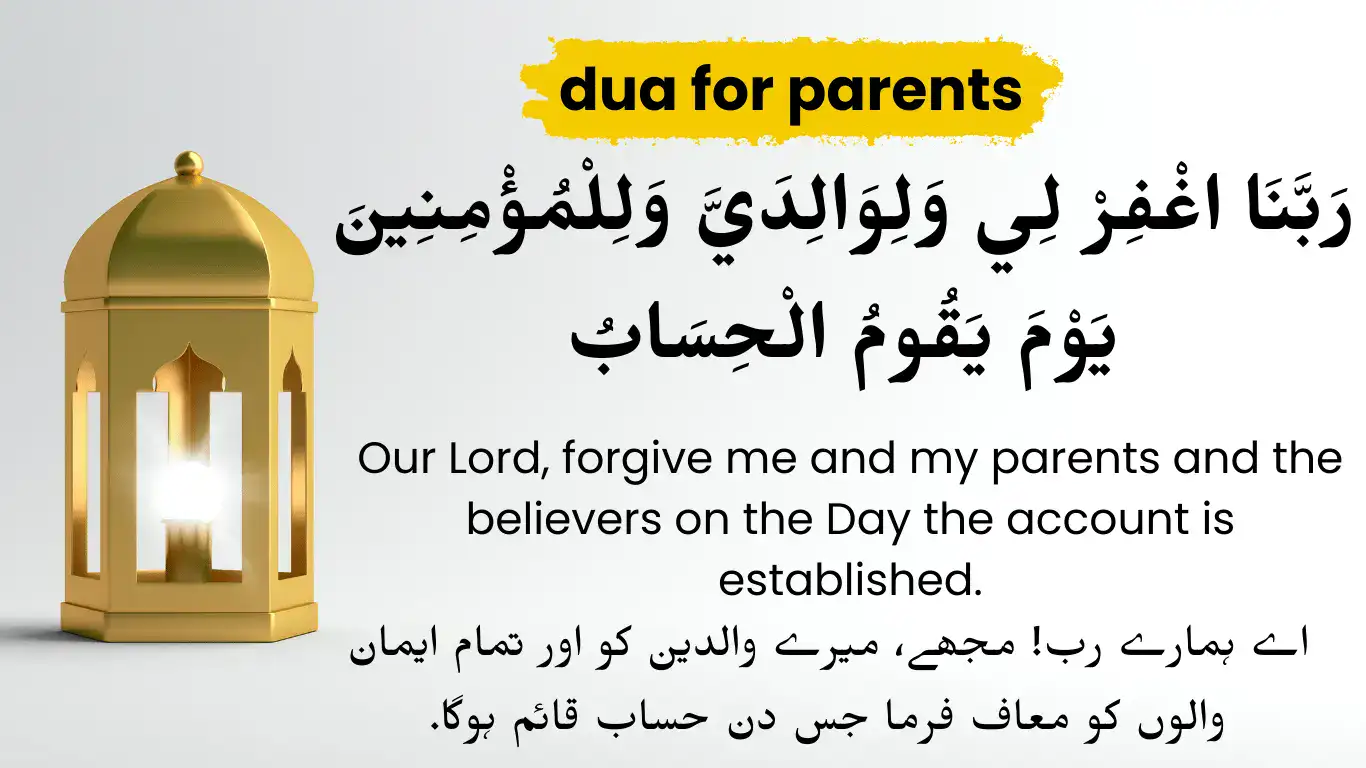Parents hold a cherished place in Islam, being the guiding lights and sources of unconditional love throughout a child’s life. Praying for one’s parents is an expression of gratitude and reverence, reflecting the immense value Islam places on family bonds. The dua for parents, also known as Allahummaghfirli Waliwalidayya (اللهم اغفر لي ولوالدي), is a heartfelt supplication for the forgiveness, mercy, and well-being of one’s parents. Let’s explore the significance of this dua, its blessings, and how to incorporate it into daily life.
| Allahummaghfirli Waliwalidayya Dua |
| Warafana laka zikrak tarjuma |
| Watu Izzu Mantasha Watu Zillu |
| Labaik Allahuma Labaik in Arabic |
The Significance of Making Allahummaghfirli waliwalidayya dua in Islam
In Islam, the respect and honor given to parents are profound. Numerous verses in the Quran and sayings of Prophet Muhammad (PBUH) emphasize the duty of children to respect, obey, and pray for their parents. The dua for parents, “Allahummaghfirli Waliwalidayya,” translates to “O Allah, forgive me and my parents,” showcasing the importance of asking Allah for their forgiveness and mercy.
In Surah Al-Isra (17:24), Allah commands, “And lower to them the wing of humility out of mercy and say, ‘My Lord, have mercy upon them as they brought me up [when I was] small.’” This beautiful reminder underlines the significance of caring for and praying for our Family, both in their lives and after their passing.
Allahummaghfirli Waliwalidayya: The Dua for Parents’ Forgiveness and Blessings
The dua, “Allahummaghfirli Waliwalidayya,” is a concise yet deeply meaningful supplication:
Arabic: اللهم اغفر لي ولوالدي
Urdu Translation: .اے اللہ! مجھے اور میرے والدین کو معاف فرما
English Translation: “O Allah, forgive me and my parents.”
This short dua holds immense power, as it not only requests forgiveness for oneself but also for one’s Family. Forgiveness is a key part of our spiritual journey, and by making this dua, we ask Allah to ease our parents’ hardships, bless them with mercy, and elevate their ranks in the hereafter.
The Benefits of Reciting Dua for Family Regularly
Praying for Family is not merely an obligation but a way to ensure they are always showered with Allah’s blessings. Some of the key benefits include:
- Expressing Gratitude and Love: Regularly reciting dua for Family reminds us of their sacrifices and the love they’ve shown us, reinforcing our bond with them.
- Seeking Forgiveness and Mercy for Parents: This dua is a powerful way to ask Allah to forgive any mistakes or shortcomings of our parents, particularly important if they have passed away.
- Gaining Reward and Allah’s Pleasure: Praying for one’s Family is considered one of the most righteous deeds in Islam, leading to abundant rewards and Allah’s favor.
- Elevating Parents’ Ranks in the Hereafter: For those whose Family have passed on, making dua for them is a way to honor their memory and continuously contribute to their legacy in the hereafter.
How to Make Dua for Family: Tips to Keep in Mind
- Sincerity is Key: While reciting dua for Family, keep your heart sincere and fully focused on asking Allah to shower His mercy on them.
- Incorporate Daily Prayers: Try to include this dua in your daily prayers, especially after each obligatory salah, so that your parents are constantly in your supplications.
- Recite for Living and Deceased Parents: Dua is not limited by time or presence. It is a gift we can give to our Family regardless of whether they are alive or have passed away.
- Additional Duas and Words of Praise: You can also add more words of prayer, such as “رَبِّ ارْحَمْهُمَا كَمَا رَبَّيَانِي صَغِيرًا” (My Lord, have mercy on them as they raised me when I was small), to ask for Allah’s encompassing mercy and care for your parents.
Other Recommended Duas for Family
In addition to the well-known “Allahummaghfirli Waliwalidayya,” there are other valuable duas that can be made for Family:
- Rabbi Arhamhuma Kamaa Rabbayani Sagheera
Arabic: رَبِّ ارْحَمْهُمَا كَمَا رَبَّيَانِي صَغِيرًا
English Translation: “My Lord, have mercy on them as they brought me up when I was small.” - Dua for Parent’s Health and Long Life
“O Allah, grant my parents good health, long life, and abundant blessings in both this world and the hereafter.” - Dua for Deceased Parents’ Peace
“O Allah, forgive my parents, elevate their status among the guided, and make their graves a source of light and peace.”
Each of these supplications reflects a specific aspect of our hopes for our parents, showing love, respect, and care for their well-being.
The Importance of Dua for Family After Their Passing
When a parent passes away, their opportunity to gain deeds comes to an end. However, Prophet Muhammad (PBUH) stated that three things continue to benefit a person after death: ongoing charity, beneficial knowledge, and a righteous child who prays for them. By making dua for deceased parents, you contribute to their eternal reward and keep their legacy alive in a spiritually beneficial way.
FAQs:
The dua for Family is a beautiful way to honor, respect, and express gratitude to them. Islam emphasizes parents’ rights due to the sacrifices they make. Reciting this dua helps in seeking Allah’s mercy, forgiveness, and blessings for them, whether they are alive or have passed on.
Yes, making dua for deceased parents is highly beneficial. Prophet Muhammad (PBUH) stated that a righteous child’s prayers for their Family continue to benefit them after their death, helping to elevate their ranks in the hereafter.
Ideally, you should recite the dua for Family daily, especially after each obligatory prayer (salah). Regularly making dua strengthens the bond with your parents and continuously brings blessings into their lives or peace to their souls if they have passed away.
Conclusion
Praying for family through the dua “Allahummaghfirli Waliwalidayya” is one of the most profound ways to honor them, whether they are alive or have departed. This dua embodies the gratitude, love, and respect we owe our family. In Islam, parents hold a sacred place, and by regularly making dua for their forgiveness and well-being, we fulfill a significant part of our faith. May Allah grant all parents His mercy and elevate their ranks, both in this world and the hereafter.




